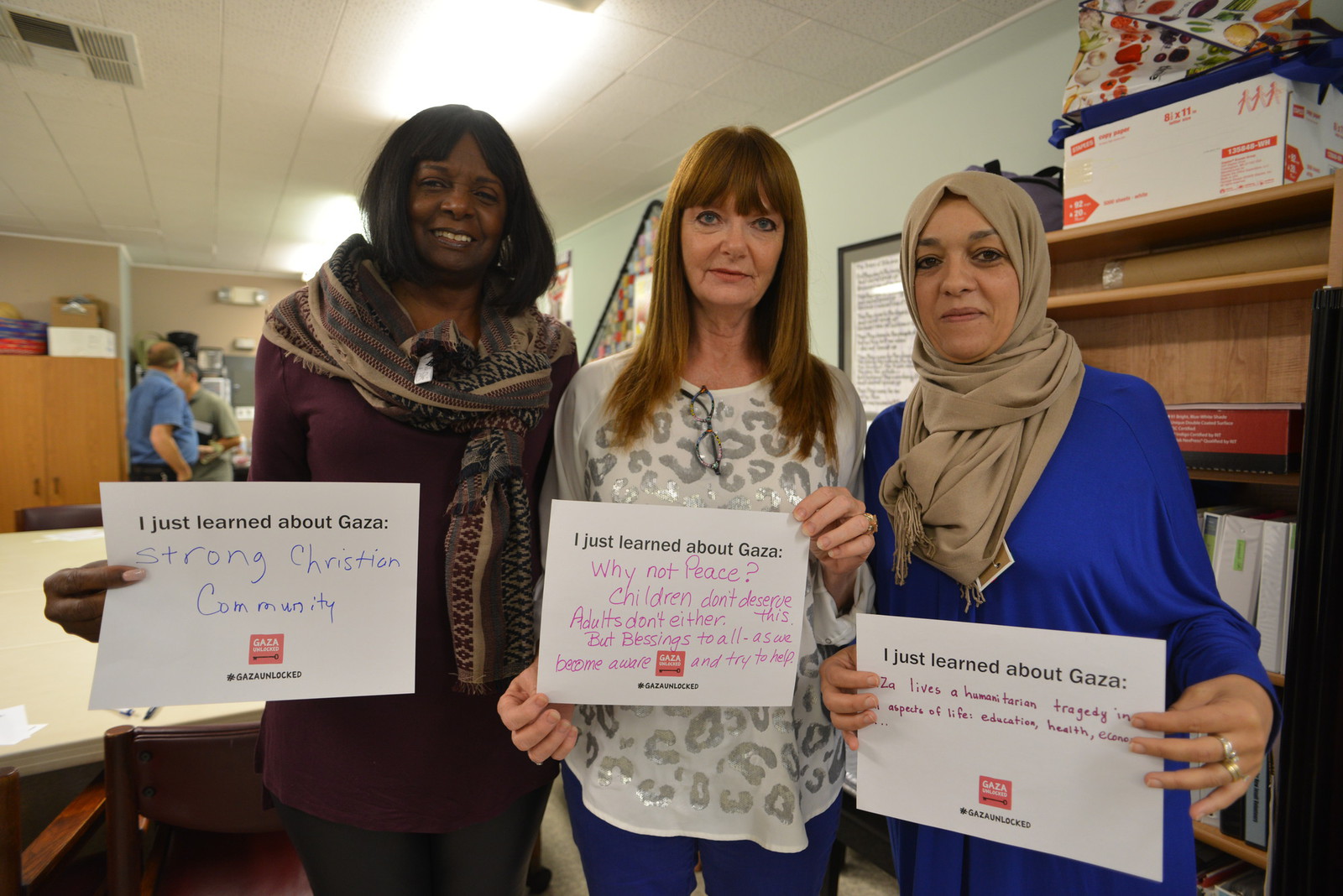
Attendees share what they learned during AFSC's recent speaking tour "Gaza from the Frontlines: Stories of Survival and Siege" with Palestinian author and journalist Mohammed Omer. Irit Reinheimer / AFSC
Activism in pushing for change while challenging U.S. policy will become even more urgent in the coming year.
This is a year of anniversaries for Israel and Palestine. It marks 100 years since the signing of the Balfour Declaration, which signaled British agreement to the formation of a Jewish state in historic Palestine. It also marks the 70th anniversary of the 1947 U.N. Partition resolution and the start of the fighting in historic Palestine that culminated in the 1948 war. And June will mark 50 years of Israeli occupation of the West Bank and Gaza.
As we look to the past, we must prepare for a year that will likely bring consequential political changes within the U.S. and Israel—changes that will have long-term impacts on efforts to achieve peace between Palestinians and Israelis. The incoming Trump administration and Congress are already taking steps that challenge the framework that has guided U.S. policy for decades.
Notably, the Trump administration's nominee for Israeli ambassador, opposes the idea of two states, supports Israeli settlements, rejects any Palestinian claim to Jerusalem, and has called Jews who support peace with Palestinians "kapos," Jewish prisoners who were forced to assist the Nazis in World War II concentration camps.

Trump's nominee to be his special representative for international negotiations, a portfolio likely to include negotiations between Israelis and Palestinians, has stated that the last time he interacted with a Palestinian was when he served as a security guard at an Israeli settlement in the West Bank. The Trump administration has also said that one of its first priorities will be to move the U.S. embassy to Jerusalem.
But this isn't a simple partisan problem. Efforts to achieve peace in Palestine and Israel have been challenged by members of Congress on both sides of the aisle.
In December, the United States allowed a U.N. Security Council resolution condemning Israeli settlements to be adopted by abstaining from a vote, despite immense political pressures. While divided on most issues, Congress came to bipartisan agreement when it passed a resolution calling for the repeal of that U.N. Security Council resolution. Since then, Congress has introduced a second bipartisan resolution calling for the U.S. to cut off all funding to the U.N. until the recent Security Council Resolution is overturned. A third bipartisan draft law would cut funding for embassies and other State Department facilities abroad until the U.S. moves its embassy in Israel from Tel Aviv to Jerusalem, violating international law and changing U.S. policy in a way that will make achieving peace more difficult.

All of this means that activism that pushes for change while challenging U.S. policy toward Israel and Palestine will become even more urgent in the coming year. At AFSC we will continue to stand for peace in a number of ways:
- We will advocate for the rights of Palestinian children while demanding an end to the Israeli military detention of children through our No Way to Treat a Child campaign.
- We will support Boycott, Divestment, and Sanctions campaigns; demand corporate accountability; and provide resources and information to individuals, groups, and investment professionals on accountable investment practices through our Investigate Tool and campaigns.
- We will build on our work in Washington, D.C., to challenge destructive U.S. policies and support those who are willing to work for a genuine peace in Palestine and Israel.
- We will organize speaking tours, develop resources, and support community-based activism working for change.
- We will launch a new campaign calling for an end to the Gaza blockade—look for more information on this campaign over the next month.
The years ahead will be full of challenges, but we are stepping up to meet those challenges.
I hope that you will continue to support our efforts and join us in working for changes to protect the rights of both Palestinians and Israelis.